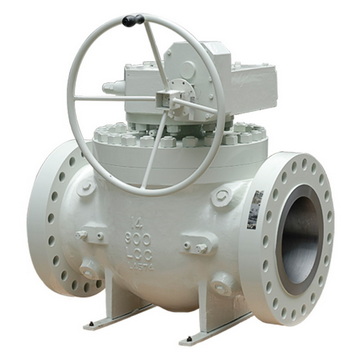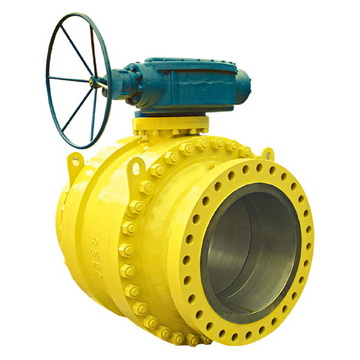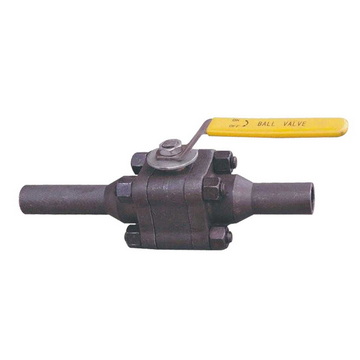Best Stainless Steel Ball Valves for High-Pressure Applications
Content Menu
● What Is a Stainless Steel Ball Valve?
● Key Features of Stainless Steel Ball Valves for High-Pressure Applications
● Types of Stainless Steel Ball Valves Manufactured
● Industry Applications and Advantages
>> Seawater Desalination and Offshore Platforms
>> Chemical and Petrochemical Plants
>> Water Treatment and Wastewater Management
● Advanced Design Considerations and Materials
● Selection and Customization Guidelines
● Frequently Asked Questions (FAQs)
>> 1. What pressure ranges can stainless steel ball valves handle?
>> 2. What is the difference between floating and trunnion ball valves?
>> 3. Can stainless steel ball valves be used in seawater environments?
>> 4. How often do stainless steel ball valves require maintenance?
>> 5. Are your valves compliant with international standards?
In the sphere of industrial fluid control, stainless steel ball valves stand out as some of the best solutions for handling high-pressure operations. Designed to offer durability, corrosion resistance, and reliable sealing under extreme conditions, these valves find broad applications in demanding sectors such as oil and gas, seawater desalination, offshore drilling platforms, chemical processing, and water treatment. As a Chinese manufacturer specializing in the design, development, and production of high-quality ball valves — including floating ball valves, trunnion-mounted ball valves, and top-entry ball valves — our OEM services cater to global brand owners, wholesalers, and manufacturers who require precision-engineered valves built for harsh environments.

What Is a Stainless Steel Ball Valve?
A stainless steel ball valve is a quarter-turn valve that uses a spherical ball with a bore to control fluid flow. By rotating the ball 90 degrees (a quarter turn), the valve shifts between open and closed states, enabling or preventing flow through a pipeline. Made from stainless steel grades such as 304 or 316, these ball valves are particularly suited for high-pressure and corrosive environments due to their mechanical strength and corrosion resistance.
The use of stainless steel ensures outstanding resistance to rust and chemical damage, allowing these valves to maintain reliable operation in some of the harshest environments. This makes them ideal choices where durability, extended lifecycle, and minimal maintenance are critical.
Key Features of Stainless Steel Ball Valves for High-Pressure Applications
- Corrosion Resistance: Especially stainless steel grade 316, which shows excellent resistance to chlorides, seawater, and harsh chemicals. This makes the valves ideal in marine, desalination, and chemical processing environments.
- Pressure and Temperature Tolerance: These valves can withstand varied pressure levels, typically rated between 150 lbs to 600 lbs pressure classes and beyond, with operational temperatures often ranging from -20ºC up to +180ºC or even higher depending on valve design and sealing materials.
- Reliable Sealing: The spherical closure element ensures a tight seal when closed. Trunnion-mounted ball valves have enhanced support for the ball through bearings (trunnions), enabling them to perform exceptionally well under very high pressures while reducing wear.
- Versatility: Available with multiple types of end connections including flanged, threaded, butt weld, and sanitary tri-clamp fittings, allowing seamless integration into different pipeline systems.
- Ease of Maintenance: Top-entry ball valve designs facilitate maintenance without needing to remove the valve body from the pipeline. This greatly reduces downtime and maintenance costs.
Types of Stainless Steel Ball Valves Manufactured
- Floating Ball Valves: In this design, the ball slightly floats within the valve body and moves downstream to seal tightly against the seat under pressure. Floating ball valves work well for medium-pressure applications with smaller to medium sizes and offer reliable performance at a more economical cost.
- Trunnion (Ear-axis) Ball Valves: These valves incorporate trunnions (bearing supports) that fix the ball in place securely. This reduces stress on the valve seats and is optimal for very high-pressure and large-diameter applications, such as main pipelines in oil and gas.
- Top-entry Ball Valves: The valve allows access to its internal components from the top without needing to remove it from the pipeline. This design simplifies maintenance, reduces downtime, and is suited for critical applications where uptime is crucial.
Industry Applications and Advantages
Oil and Gas Industry
Stainless steel ball valves play an essential role in upstream production, midstream pipeline transportation, and downstream refinery processes. Due to their ability to handle high pressures and corrosive fluids such as sour gas, crude oil, and natural gas, these valves ensure secure flow control, safety, and reliability in oil rigs, pipelines, and processing plants.
Seawater Desalination and Offshore Platforms
The corrosion resistance of 316 stainless steel makes these ball valves perfect for seawater environments. In desalination facilities, their durability against saltwater and chemicals ensures long-term operation. Offshore drilling rigs also demand valves that can withstand pressure variations, salt spray, and marine atmospheric conditions without degradation.
Chemical and Petrochemical Plants
Handling aggressive chemicals requires valves that resist corrosion, maintain integrity, and ensure leak-tight performance. Our stainless steel ball valves meet these criteria, facilitating safe flow control of acids, bases, solvents, and other hazardous fluids in chemical reactors, pipelines, and storage systems.

Water Treatment and Wastewater Management
Water and wastewater treatment plants use stainless steel ball valves for their resistance to corrosion and leakage, ensuring operational safety in potable water delivery and effluent treatment systems. Their reliability minimizes contamination risks and maintenance needs in critical water infrastructure.
Food and Beverage Industry
Sanitary-grade stainless steel ball valves comply with strict hygiene standards, resist microbial growth, and allow easy cleaning. They are commonly used in breweries, dairy processing, bottling plants, and other food manufacturing industries where preventing contamination is paramount.
Advanced Design Considerations and Materials
To enhance performance under extreme conditions, various advanced design features and material enhancements are incorporated:
- Fire-Safe Designs: Some ball valves include fire-safe features to ensure sealing integrity and operational reliability even after exposure to fire or extreme heat.
- Cryogenic Capabilities: Valves designed for low-temperature operations maintain performance in cryogenic environments used in LNG processing.
- Special Sealing Materials: Depending on the media, seals may be made from PTFE, reinforced PTFE, PEEK, or metal seats to accommodate high temperature, chemical aggressiveness, and pressure.
- Automation Ready: Our valves are designed for easy integration with pneumatic or electric actuators, enabling remote operation and automation in modern industrial plants.
Selection and Customization Guidelines
Choosing the right stainless steel ball valve depends on multiple factors:
- Pressure and Temperature Ratings: Ensure the valve is rated for your system's pressure and temperature needs.
- Valve Type: Select floating ball valves for smaller and medium pressure systems, and trunnion ball valves for very high pressure and large diameter pipelines.
- Connection Type: Based on pipeline design, choose from threaded, flanged, butt weld, or sanitary tri-clamp ends.
- Material Grade: Select 304 stainless steel for general corrosion resistance, or 316 and higher grades for aggressive or marine environments.
- Standards Compliance: Ensure the valve meets relevant API, ASME, ISO, DIN, GB standards required by your industry or region.
- Special Features: Consider automation options, fire-safe construction, cryogenic suitability, or custom coatings if applicable.
OEM customization allows exact matching of features, dimensions, coatings, or certifications based on client specifications, providing tailored solutions for challenging applications.
Conclusion
Our stainless steel ball valves represent the ultimate solution for high-pressure applications across diverse demanding industries. Combining superior corrosion resistance, robust design, and reliable sealing performance, these valves ensure operational safety, longevity, and efficiency even in extreme environments such as oil and gas extraction, seawater desalination, chemical processing, and food manufacturing. With our extensive experience, flexible OEM services, and commitment to quality, we deliver valves that not only meet but exceed client expectations worldwide. Contact us today to explore how our expert engineering and premium ball valves can support your projects and enhance your operational success.

Frequently Asked Questions (FAQs)
1. What pressure ranges can stainless steel ball valves handle?
Stainless steel ball valves can typically handle pressures ranging from 150 lbs up to 600 lbs and higher, depending on their design, ratings, and application.
2. What is the difference between floating and trunnion ball valves?
Floating ball valves have a free-moving ball that seals against the seat by pressure, suitable for lower to medium pressure. Trunnion ball valves have the ball fixed with bearings to support it, optimal for very high pressure and large diameter pipelines.
3. Can stainless steel ball valves be used in seawater environments?
Yes, especially those manufactured from 316 stainless steel, which provides excellent corrosion resistance against saltwater, making them ideal for desalination plants and marine use.
4. How often do stainless steel ball valves require maintenance?
Maintenance depends on operating conditions but valves with a top-entry design enable easy servicing without pipeline removal, reducing maintenance time and costs.
5. Are your valves compliant with international standards?
Our ball valves comply with major international standards including API, ASME, ISO, DIN, and GB, ensuring they meet global quality and safety requirements.
Hot tags: Best Stainless Steel Ball Valves for High-Pressure Applications, High-Pressure Stainless Steel Ball Valve Manufacturers, Industrial Stainless Steel Ball Valve for High Pressure, Top High-Pressure SS Ball Valve Suppliers, Durable Stainless Steel Ball Valves for Heavy Duty Use, High-Pressure Threaded Stainless Steel Ball Valve, 1000 PSI Stainless Steel Ball Valve for Industry, Corrosion-Resistant High-Pressure Ball Valves, Stainless Steel Ball Valve for Oil and Gas Applications, High-Pressure Stainless Steel Ball Valve Price Guide